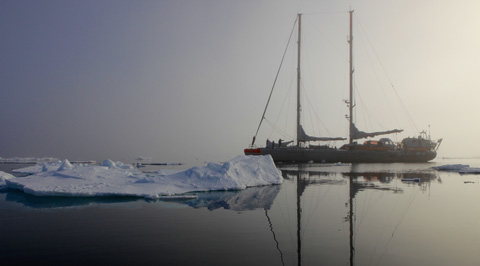Tara Oceans expedition: researchers map the world of plankton
An international, interdisciplinary team of scientists shared the first results of the 2009-2013 Tara Oceans expedition on 22 May 2015 in a special issue of Science. On the basis of a portion of the 35,000 samples collected from all the world’s oceans during the expedition, the team mapped the biodiversity of a wide range of planktonic organisms, explored their interactions, and how plankton impact and are affected by their environment. This data provides the scientific community with unprecedented resources, including a catalogue of several million new genes that will transform how we study the oceans and assess climate change. IOC-UNESCO is one of the main partners of Tara Expeditions.
This expedition was the very first attempt to accomplish a global study of marine plankton, the only truly continuous ecosystem at a planetary scale. Studying these tiny organisms is like taking the pulse of our planet as they form the base of the marine food chain, store CO2 and use their photosynthetic activity to act as an immense oxygen pump. However, their ecosystems remain one of the least explored fields of oceanography.
Over a period of four years, scientists on board the schooner ‘Tara’ captured viruses, microbes and microscopic eukaryotes – organisms with complex cells, from single-cell algae to fish larvae – from major oceanic regions. They compiled their genetic material into comprehensive resources that are now available to the scientific community for further studies.

Plankton collected in the Pacific Ocean, a mixture of multicellular organisms – small zooplanktonic animals, larvae and single cell protists (diatoms, dinoflagellates, radiolarians). ©Christian Sardet/CNRS/Tara Expéditions
“This is the largest DNA sequencing effort ever done for ocean science: analyses revealed around 40 million genes, the vast majority of which are new to science, thus hinting towards a much broader biodiversity of plankton than previously known,“ explained Patrick Wincker from the French national sequencing centre, Genoscope, CEA. Plankton appears to be a surprisingly diverse group of species, surpassing the diversity of bacteria or animals, with many belonging to little-known groups.
As a first step towards a better understanding of the dynamics and structure of the global marine ecosystem, the researchers mapped the interactions between planktonic organisms, revealing that planktonic interactions are mainly parasitic, recycling nutrients back down the food chain.
In addition to biotic interactions, the scientists studied how environmental factors – such as temperature, pH, and nutrients (amongst others) – influence the microscopic organisms floating in the ocean. “We found that, at depths still reached by sunlight, temperature was the main factor that influences the composition of prokaryotes (bacteria and archaea) communities,” said Peer Bork from EMBL. “Different sets of organisms come together depending on the water temperature.”

The route of the voyage was chosen so that the major oceanic systems could be monitored. ©bepoles/Tara Expéditions
The uniqueness of the Tara Oceans ‘eco-systems biology’ approach is to have sampled the world’s oceans systematically across all domains of life, from viruses to animals, and including a rich variety of environmental data. The data generated sets a baseline, on a global scale, to evaluate the impact of climate changes on oceanic ecosystems in the future.
“The finding that temperature shapes which species are present, for instance, is especially relevant in the context of climate change, but to some extent this is just the beginning,” said Chris Bowler, from CNRS. “The resources we’ve generated will allow us and others to delve even deeper, and finally begin to really understand the workings of this invisible world.”
“This Tara Oceans expedition in terms of sailing can be compared with the voyage of HMS Challenger. Both of these expeditions changed the oceanography. The one on Tara provided an unprecedented volume of DNA analysis for planktonic communities,” said Vladimir Ryabinin, Executive Secretary of the Intergovernmental Oceanographic Commission and Assistant Director General. “The new knowledge of the sensitivity of plankton to ocean temperatures is particularly relevant for our time, when ocean absorbs more than 90% of excessive heat associated with anthropogenic carbon emissions. This sensitivity may be a key factor in conservation of marine biodiversity in the warming world.”
UNESCO’s Intergovernmental Oceanographic Commission (IOC-UNESCO) is one of the main partners of the Tara Oceans expedition, along with Agnès B, the Prince Albert II of Monaco Foundation, Genoscope, the Shirshov Institute of Oceanology (Russia), King Abdullah University of Science and Technology (Saudi Arabia), NASA, IUCN and others.

Tara in the Arctic Ocean. ©A.Deniaud/Tara Expéditions
Besides supporting scientific research, Tara Expeditions and IOC-UNESCO work together to promote ocean education and public awareness on the crucial role our ocean plays in global warming and to encourage sustainable management of the environment.
To further underline the importance of the ocean, IOC-UNESCO and Tara Expeditions are organizing, in cooperation with other partners, the main event dedicated to the ocean and its link to the climate system in preparation of the Paris Climate Conference (COP21). With the help of scientific workshops, plenary sessions, and exhibitions, this day will bring together scientists, political decision-makers, civil society and youth to identify, through dialogue, promising ocean-sensitive actions and strategies to mitigate climate change and its socioeconomic impacts. Do you want to be part of a worldwide movement to help preserve the ocean and put the ocean on the agenda for the 2015 Paris Climate Conference (COP21)? Join us on World Oceans Day 2015 (8 June).
Related links:
- Tara Expeditions’ official press release
- Tara Expeditions official website
- Science Magazine, A World of Plankton, 22 May 2015
- World Oceans Day: Ocean and Climate (8 June 2015 at UNESCO headquarters, Paris, France):
<- Back to: Natural Sciences


